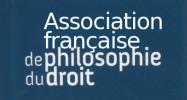Paper's abstract
Catherine
Kintzler,
Laïcité and philosophy
Laïcité is neither a contract nor a current of thought in the usual meaning of the word, nor a "cultural exception". It is a philosophical concept which, unlike the notion of tolerance, is not intended to ensure the coexistence of freedoms as they are in a given society but to build an a priori space being the condition of opportunity of such a coexistence. We try to show that this concept works in the same way as some kind of experimental emptiness : it is possible to create a political association without relying on pre-existing communities in such a way that the principle dissolving the social link constitutes the political link. More widely, the concept postulates a critical stand that begins a dialectic of doubt and a conception of humanities. Finally, laïcité having no worse enemy that civil religion, we suggest that the current sacralisation of the social link, and more generally of the mere form of religious thinking, is a modern variant of theologico-politics.
Key Words : tolerance, community, political association, humanities, civil religion
t. 48, 2004 : p.43-56
